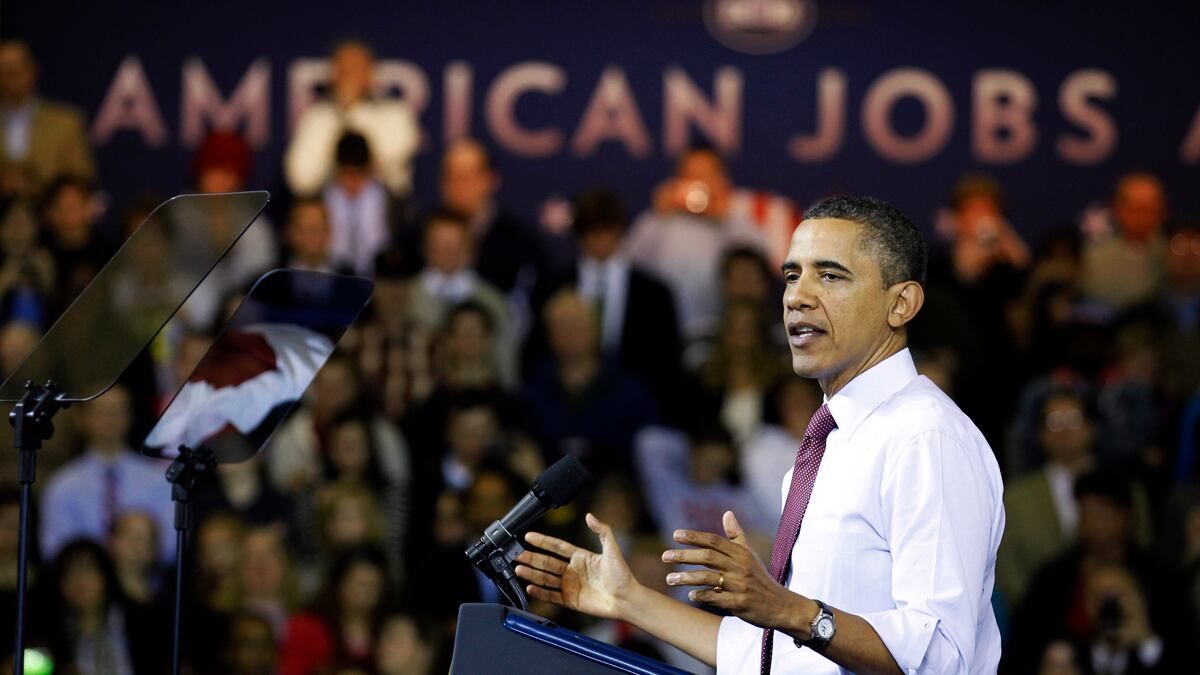President Obama is determined to mount a full-court media campaign to extend a payroll tax cut that expires at year’s end, which is why I found myself at the White House on Wednesday listening to two senior administration officials trying to ratchet up pressure on the Republicans.
A Senate vote is expected later this week, and Obama traveled to Scranton, Pa., to make a pitch for the legislation, warning the economy would suffer a “massive blow” if Congress doesn’t act. The president insisted that Congress stay in session, forgoing the traditional holiday break if necessary, until it green-lights the tax cut along with a continuation of unemployment benefits. “The math is just very clear,” said one of the officials, making the case that the economy, as weak as it is, can’t abide the loss of this critical assistance.
The two things that matter most in how fast the U.S. economy grows, said the other official, are what happens with the debt crisis in Europe, where the administration can assist only at the margins, and here at home, if Republicans allow action in Congress. “It’s in their hands,” he said. After months of mostly stalemate, Senate GOP leader Mitch McConnell blinked this week, saying he favors extension of the payroll tax cut, and now the fight is over how to pay for it. “Our focus for the next three days is to shine a spotlight on the Senate vote, which I think has enormous clarity,” said the first official.
By enormous clarity, he means to highlight the GOP’s opposition to paying for the tax cuts with a surcharge on incomes of more than $1 million. McConnell is promising a Republican alternative that will likely feature an assortment of spending cuts that Democrats will find objectionable—“like stopping poor kids from getting lunch at school,” quipped Bill Burton, a former Obama press spokesman who now runs Priorities USA, a pro-Obama group.

The White House was doing more than speaking to reporters on background; senior adviser David Plouffe made the case Wednesday night on Rachel Maddow’s MSNBC show.
The budgetary brinksmanship is significant in a struggling economy. The current payroll tax break reduced the Social Security tax to 4.2 percent on the first $106,800 in wages this year, down from the normal 6.2 percent. Obama wants to expand the cut to 3.1 percent and also cut the employer’s portion of the payroll tax to 3.1 percent. This year’s break translates into $1,000 for the average family; if expanded, it would put $1,500 into the pockets of workers.
Republicans are clearly feeling the heat, insisting they have been for the tax-cut extension all along and that Obama is the one who’s picking the fight. “He must not have read the morning papers,” said McConnell spokesman Don Stewart, citing headlines from seven major media outlets heralding the GOP’s support for the payroll-tax extension.
Still, there is that little matter of what policymakers call the “pay-fors,” which are already framing next year’s presidential contest. “When is the last time you heard a Republican say you have to pay for tax cuts?” asked one of the senior administration officials. Nodding agreement, the other official dubbed the burst of probity around tax cuts “a newfound religion” for the GOP.
The White House has always believed that the Republican position—to allow these key elements of the president’s jobs bill lapse—is unsustainable. “We always expected them to get to this point,” said one of the senior officials, expressing surprise only that it took this long.
Among the Republican presidential candidates, some are for extending the payroll tax cut, some are against it, “and some have two positions—you can guess who that is,” said the official, taking a jab at Mitt Romney, who has dismissed the tax cut as “a temporary little Band-Aid” but hasn’t rejected it either.
Once the primaries are over, Republicans may be looking more to the center of the electorate. House Republicans, the official noted, are in a “fairly precarious position” and will be hard put to claim they’ve done anything to improve the jobs picture: “You’ve got to have something to say about the economy. This is just raw politics.” And while he doesn’t envision a replay of 1996, when House Republicans led by Newt Gingrich worked with President Clinton to pass welfare reform—groundbreaking legislation that helped secure Clinton’s reelection—the senior official thinks there could be some opportunities to cooperate. An infrastructure bank, for example, has support in both parties and in both chambers. “In a rational world, even in an election year, you can get some things done,” he said.
Pressed on when anything deemed a temporary tax cut can expire, given the nature of today’s politics, the administration officials noted that at the end of next year, the Bush tax cuts, the payroll tax cut (assuming it’s extended for one year), and an assortment of business tax incentives all expire—plus the $1.2 billion in automatic cuts mandated by the supercommittee’s failure—all of which provide “a huge incentive” to come back and do major tax reform. Obama has already said he would veto any congressional attempt to wiggle out of the mandatory spending cuts.
Win or lose in November, Obama will be president when all these deadlines loom, veto pen at the ready. With those battles ahead, today’s skirmish feels like shadowboxing, as each side gets ready for an election year with winner-take-all stakes.





